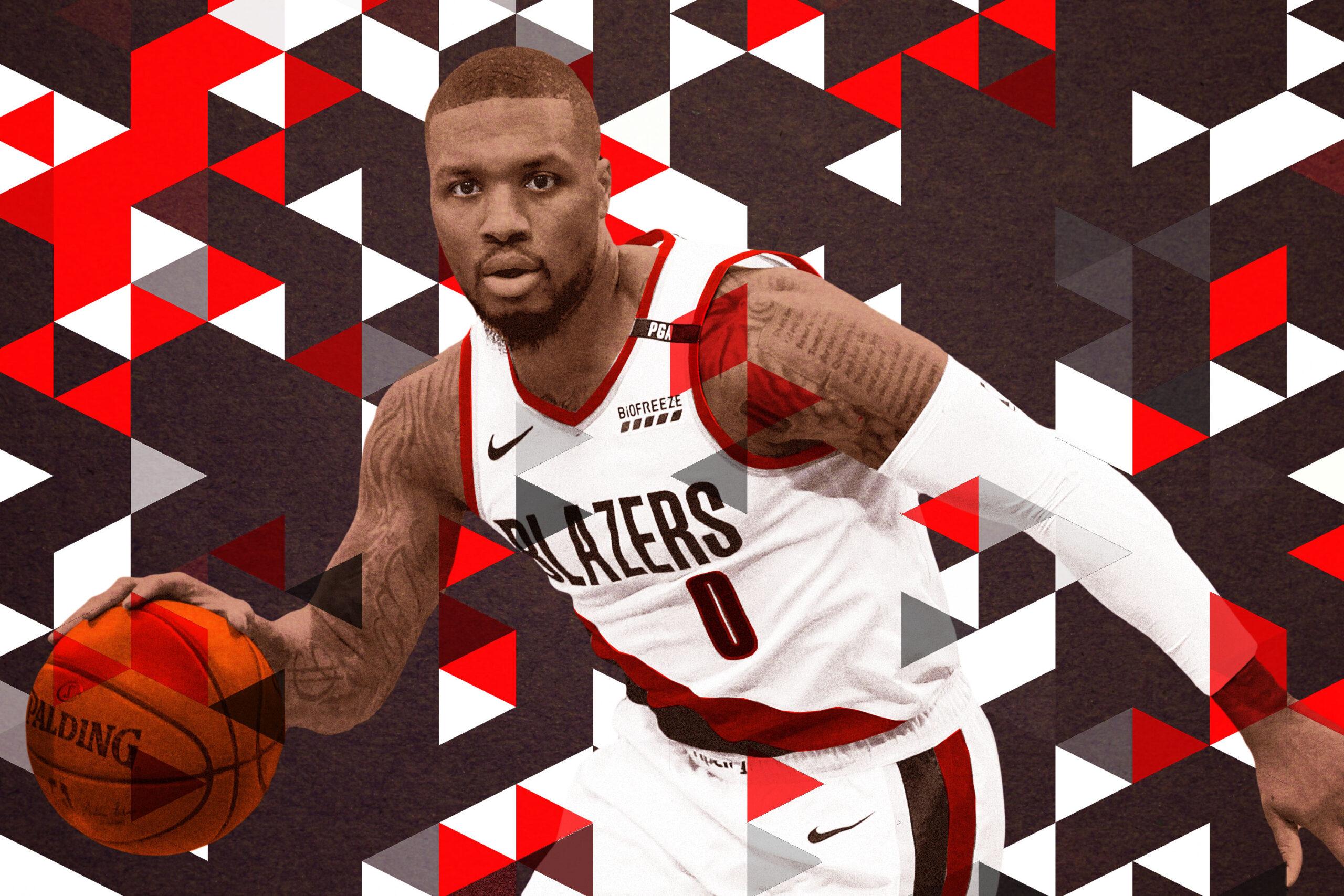
Damian Lillard didn’t have much of an argument, but right or wrong wasn’t really the point. As Lillard tracked Russell Westbrook in transition in the fourth quarter of Tuesday’s Game 2, Steven Adams, a Trenta of a man, laid out the Trail Blazers guard just past midcourt with one well-timed screen. When the action stalled the other way, Lillard sought an audience with the Thunder center.
The play was perfectly legal, despite Dame and Charles Barkley’s disapproval; Adams, whose size belies his unique levelheadedness, agreed: “That was a weird situation.” Maybe. But you don’t confront the biggest and baddest guy in the room looking to parse logic. You do it because you’re in the midst of a monster performance, in the biggest playoff series of your career, and you want to make it perfectly clear that nobody can fuck with you.
Watch Lillard after the refs break up the small circle of rubbernecking teammates. “We’re just talking,” he appears to say to one official. He’s just talking, sure, but in the same way Vinnie from Queens does with his arm wrapped around the head of someone who’s late with the vig.
Adams continues to state his case; he told reporters postgame that it was the responsibility of Lillard’s big man to call out the screen in that situation—which, again, is correct. Dame’s closing argument?
If there’s been a more you-can’t-fuck-with-me face in recent playoffs history, I haven’t seen it. With a nod and a pout, Lillard says, I hear you, but I don’t. It’s, You may be right, but it doesn’t matter. It’s bravado and swagger and all the other puffed-out-chest shit that your intellectual self can easily dismiss as theater but is so viscerally satisfying that your lizard brain takes over and you can only think in exclamation points. Westbrook would have loved it, if he weren’t also getting his ass busted.
The pugnacious Blazers guard has been involved in plenty of, um, disagreements over his seven-year career, and surely will have a hand in plenty more. But this particular bark resonates more than any before it.
Portland has been on Lillard Time ever since the then-second-year guard drilled that walk-off 3 to eliminate the Rockets in 2014. But Lillard’s time, in the NBA writ large, has yet to come—not necessarily through any fault of his own, either. Wes Matthews’s untimely Achilles injury felled a dark horse contender, the departure of LaMarcus Aldridge forced a roster reimagining, and the Blazers came away from the past two postseasons with nothing but a pair of black eyes and another round of questions about the viability of the Lillard–CJ McCollum backcourt. Lillard was a Rookie of the Year, an All-Star, even a first-team All-NBA member; his year-over-year production is mostly exponential growth—an accomplishment for any player, let alone someone who’s been top-10 in points per game since 2015-16. But it’s hard to carve out the time and energy to give such a player their proper due when their best effort ultimately comes in a cut below the very best in the league.
What do you do with a player with the range and confidence to jack a shot from the logo but who can’t do so at the mind-bending efficiency of Steph Curry? A player who’s a bad-ass motha who won’t take no crap off of nobody but who isn’t a lightning rod like Westbrook? Someone with the personality to sell shoes and records and a streaming cable service, but doesn’t pass the Mom Test? You kind of forget about them, unfortunately. You reward the raw numbers, and then you move along. Superstardom is a black box, but the laymen and the marketing gurus would probably agree that the cliché holds true in this case: Win and the rest will take care of itself. And the Blazers’ postseason record under Lillard has been rather unremarkable.
This year has been different. Through two games against the Thunder, Lillard has feasted like never before: 29.5 points on 45 percent shooting, including 47 percent shooting from 3 at volume. Better still, any fear of shell shock from last year’s blitzkrieg by the Pelicans has quickly been erased by literal chest-thumping confidence. Lillard’s first shot of the series was a pull-up 3 from the scorer’s table. He’s taken nearly as many 3s from 29 feet and out (seven) as he has from 25 feet and in (eight).
The biggest difference, though, may be the circumstances. Portland wound up in the path of buzz saws in successive years—against a team that nearly swept the playoffs followed by an all-time bad matchup—but the Rockets’ drop to the 4-seed on the last day of the regular season created a wide-open runaway for any of the Blazers, Nuggets, Spurs, or Thunder. And with OKC’s hopes dependent on two things they don’t have right now—a healthy Paul George and the ability to hit 3s—a second-round series against an inexperienced Nuggets team, or a Spurs team that could struggle to keep up with the NBA’s third-best offense, seems likely. Lillard is indeed having a moment, but a rally by his team’s five worst players in Game 82 has set him up with the opportunity to reset his reputation.
It would be particularly notable to do so against Westbrook, still the avatar for the homegrown, small-market hero after helping the Thunder get to four Western Conference finals appearances (even though he has won just three playoff games since Kevin Durant’s fateful Hamptons stay). And as the back-and-forth between him and Westbrook has gotten more intense, Lillard has made it a personal mission to show up his counterpart, just like Jrue Holiday did to him.
Lillard’s deep 3 in front of a flat-footed Westbrook with 2:23 left to play was the backbreaker in Game 1. In the third quarter of Game 2, Lillard took delight in showing Westbrook how to shoot a 3:
A confrontation or two between the prickly All-Star guards was inevitable, but Westbrook made his best effort at turning the matchup into hand-to-hand combat in Game 2. Late in the second quarter, Lillard swiped at the ball and Westbrook fell to his knees. Lillard reached for the ball again, and Westbrook, as he is wont to do, took umbrage. Westbrook snarled and flailed; Lillard responded with a shove light enough to avoid a flagrant yet firm enough to tip Westbrook over like Humpty Dumpty. Lillard could’ve stopped right there—Westbrook would’ve played up the moment for the officials, but that would be that. Instead, Lillard loomed over him just long enough for the former MVP to notice:
He didn’t have to say anything that time.

